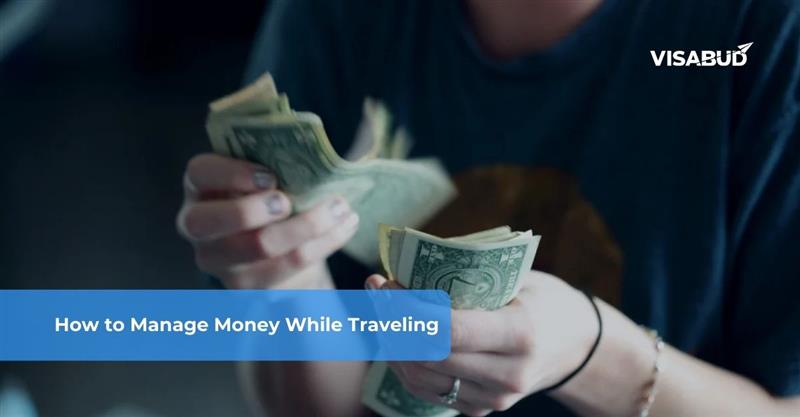Traveling is undoubtedly one of the most rewarding experiences you can have, but managing your finances while on the road can be a daunting task. Whether you’re embarking on an adventurous backpacking journey across Europe, immersing yourself in the cultural richness of Asia, or simply enjoying a laid-back beach vacation, keeping your money in check is crucial for a smooth and stress-free trip. Without proper financial management, unexpected expenses can quickly derail your plans and leave you with a strained budget.
To help you navigate this challenge, it’s important to have a solid plan in place before and during your travels. Managing money while traveling requires a combination of preparation, organization, and flexibility. By setting a realistic budget, understanding exchange rates, and utilizing the right tools, you can ensure that you have enough funds to enjoy your trip without overspending or running into financial trouble.
In this guide, we will explore practical strategies and essential tips to manage your money effectively while traveling. Whether it’s using mobile apps to track your spending, finding the best exchange rates, or knowing when to use a credit card versus cash, we’ll provide insights on how to avoid common pitfalls and make the most of your travel budget.
Additionally, we’ll cover how to stay safe with your finances by minimizing risks like theft or loss of money, and how to prepare for unexpected costs such as medical emergencies or unforeseen travel delays. By implementing these tips, you’ll be able to focus on what matters most, enjoying the journey and creating unforgettable memories while maintaining financial peace of mind throughout your travels.
1. Set a Travel Budget Before You Leave
The foundation of managing money while traveling begins before you even leave your home. Setting a realistic travel budget is essential to avoid overspending and running into financial trouble. Here’s how you can set a budget for your trip:
A. Calculate Your Total Budget
Start by determining how much money you have available for your trip. This will include savings, any funds you plan to allocate from your regular income, or perhaps any external sources of income like freelance work. Be sure to factor in any pre-trip expenses, such as flight tickets, travel insurance, accommodation deposits, and necessary gear purchases.
B. Break Down Your Expenses
Once you have your total budget, break it down into categories such as:
C. Set Daily Spending Limits
Based on your total budget and the duration of your trip, you can set a daily spending limit. For example, if you have $3,000 for a 30-day trip, your daily budget would be $100. This amount should cover all your expenses for the day, including transportation, meals, and entertainment.
D. Prioritize Essentials
Ensure you prioritize the essentials in your budget, such as accommodation, food, and transportation, before allocating funds to non-essentials like shopping or souvenirs. This ensures that you are financially prepared for the necessities of the trip.
2. Use the Right Currency for the Job
Handling currency while traveling can be one of the most confusing aspects, especially if you’re traveling to multiple countries. Here are a few strategies to handle your money effectively:
A. Carry Local Currency
It’s essential to have some local currency on hand, especially for smaller purchases like street food, tips, or transportation. You can exchange money at airports, exchange bureaus, or withdraw cash from local ATMs once you arrive. However, be mindful of exchange rates and fees.
B. Use Credit and Debit Cards
Using credit and debit cards is often more convenient and safe than carrying large amounts of cash. Internationally accepted cards like Visa, Mastercard, and American Express are accepted in most countries. However, be aware of the following:
C. Prepaid Travel Cards
Prepaid travel cards are a great way to control your spending and avoid overspending. You load the card with a specific amount of money and can use it just like a regular credit card. These cards also provide a safety net in case your wallet gets lost or stolen.
3. Minimize Fees and Exchange Rate Costs
When traveling, hidden fees can quickly add up, impacting your budget. To manage your money effectively, it’s crucial to minimize costs related to currency exchange and payment transactions. Here are a few tips to help you save money while abroad:
A. Use ATMs Wisely
Withdrawing cash from an ATM is often the most cost-effective way to get local currency, but it’s important to choose the right ATM.
B. Monitor Exchange Rates
Exchange rates can fluctuate, so it’s important to keep an eye on them to get the best deal.
By being strategic with ATM withdrawals and monitoring exchange rates, you can avoid unnecessary fees and stretch your travel budget further.
4. Keep Your Money Safe
When managing money abroad, ensuring its safety is a top priority. Carrying large sums of cash or failing to properly protect your finances can lead to significant losses. To safeguard your money, follow these essential tips:
A. Use a Money Belt or Neck Pouch
Money belts and neck pouches offer a discreet way to keep your cash, credit cards, and important documents safe. These accessories are especially useful in crowded or tourist-heavy areas where pickpockets are more likely to strike. Wearing these close to your body reduces the risk of theft.
B. Use Lockable Luggage
Investing in luggage with lockable zippers adds an extra layer of security. This is particularly important when you need to leave your bags unattended in public spaces or hotel rooms. For added protection, consider using a TSA-approved lock on your luggage.
C. Don’t Carry All Your Money in One Place
Avoid keeping all your money in one spot. Split your funds between your wallet, a money belt, and a hidden pouch or safe. Keeping a small amount in your wallet for daily expenses and larger sums in a secure location reduces the risk of losing everything at once.
D. Report Lost or Stolen Cards Immediately
If your credit or debit card is lost or stolen, contact your bank or card issuer immediately. Most institutions offer 24/7 hotlines to report fraudulent activity, allowing them to freeze or cancel your card to prevent unauthorized charges.
5. Use Technology to Your Advantage
Managing money while traveling has become more convenient thanks to a variety of apps and tools designed to help you stay on top of your finances. Here’s how you can use technology to your advantage:
A. Budgeting Apps
Tracking your spending is crucial to staying within budget while traveling. Several apps can help:
B. Currency Converter Apps
When exchanging money abroad, using a currency converter app is essential to ensure you’re getting the best rate. Apps like XE Currency and Currency Converter Plus provide real-time exchange rate updates, allowing you to make informed decisions before making conversions.
C. Mobile Payments
Mobile payment systems like Apple Pay, Google Wallet, and local apps such as WeChat Pay in China are widely accepted in many countries. These apps let you make secure payments without needing physical cards or cash, offering convenience and security while you’re traveling.
6. Control Your Spending While Traveling
Controlling your spending while traveling is just as important as managing your money. Without proper discipline, it’s easy to overspend and strain your budget. By adopting a few smart habits, you can enjoy your trip without worrying about financial stress.
A. Track Your Daily Expenses
One of the best ways to stay on top of your finances is to track your expenses daily. Take a few minutes each evening to review what you spent during the day. Use a budgeting app like Trail Wallet or even a simple notebook to log your expenses. Tracking helps you stay aware of where your money is going and alerts you if you’re approaching or exceeding your daily budget. Being mindful of your spending encourages smarter financial choices throughout your trip.
B. Avoid Impulse Purchases
Impulse buying can quickly eat into your travel budget. When you see a souvenir or item you like, resist the urge to buy it immediately. Give yourself some time to think — perhaps wait a day or two. Often, you’ll realize the item isn’t necessary or that you can find a better or cheaper alternative later. This practice not only saves money but also ensures that the items you do purchase hold real value to you.
C. Look for Free Activities
Many destinations offer a wealth of free or low-cost activities. Free walking tours, public museums, local festivals, parks, beaches, and hiking trails can provide amazing experiences without straining your wallet. Research free attractions before you arrive to get the most out of your trip while keeping costs low.
7. Plan for Emergencies
Even with thorough preparation, unexpected challenges can arise while traveling. Medical emergencies, flight cancellations, lost belongings, or natural disasters can quickly derail your plans and drain your finances. To protect yourself, it’s essential to plan ahead for emergencies.
A. Emergency Fund
Always allocate a portion of your travel budget specifically for emergencies. This emergency fund should be kept separate from your daily spending money and reserved only for unforeseen situations. It can cover unexpected medical expenses, last-minute accommodations, transportation changes, or even replacing stolen items. Having this cushion ensures you won’t be stranded without funds if something goes wrong.
B. Travel Insurance
Investing in travel insurance is one of the smartest decisions you can make before setting out. A good travel insurance policy can cover medical emergencies, trip cancellations, lost luggage, and even evacuation in extreme situations. Make sure to read the policy details carefully to understand exactly what’s covered. Choose a plan that aligns with your travel activities — for instance, adventure travelers may need additional coverage for high-risk sports.
C. Emergency Contacts
Prepare a list of important emergency contacts before you leave home. Include the contact information for your country’s embassy or consulate, local hospitals, and your bank’s emergency hotline for lost or stolen cards. Keep both digital and hard copies accessible during your trip. Having this information readily available can save precious time and stress if you find yourself in a difficult situation.
8. Pay Attention to Local Tipping Customs
Tipping customs vary widely around the world, and understanding local expectations can help you manage your travel budget more effectively and avoid any cultural misunderstandings. In some countries, tipping is an important part of service workers’ income, while in others, it can even be considered inappropriate.
In the United States, tipping is a significant part of the service culture. It is customary to tip restaurant servers around 15–20% of the total bill. Bartenders, taxi drivers, hotel staff, and tour guides also generally expect tips, so it’s important to budget for these additional expenses.
In Europe, the tipping culture varies by country, but generally, service charges are often included in the bill at restaurants. However, it’s still appreciated to leave a small additional tip, typically around 5% to 10%, especially for good service. In cafes, bars, and casual eateries, rounding up the bill or leaving a few extra euros is common practice.
In Japan, tipping is neither expected nor encouraged. In fact, attempting to tip can sometimes be considered rude or confusing. Excellent service is already built into the culture, and workers take pride in doing their job well without the expectation of extra payment. If you do wish to show appreciation, it’s better to offer a small gift rather than money.
9. Use Local Banking Systems When Possible
Using local banking systems can be a smart way to manage your money efficiently while traveling. In many countries, local banks offer services that are more affordable and convenient compared to relying solely on your home bank’s cards and international networks.
Before you travel, research the banking options available in your destination. Some countries have local banks that provide lower withdrawal fees, better exchange rates, or even partnerships with international banks that waive ATM fees for visiting customers. If your home bank has a partner bank in your travel destination, you might be able to access your money without paying hefty withdrawal charges or foreign transaction fees.
Additionally, some local banks offer special travel cards or temporary accounts for tourists. These options can help you avoid the high fees that often come with using foreign cards abroad. Setting up a temporary account might seem like an extra step, but it can significantly reduce the costs associated with money management over a longer trip.
Another advantage of using local banking systems is greater access to services tailored to the region. Local apps and mobile banking options can make it easier to transfer money, pay for services, and monitor your spending in real-time.
10. Learn to Navigate the Tax System
Understanding how to navigate the tax system while traveling can help you save a surprising amount of money, especially on larger purchases. In many countries, particularly throughout Europe, tourists are eligible for VAT (Value-Added Tax) refunds on goods purchased during their trip. Taking advantage of this benefit can make your travels more affordable and rewarding.
VAT is a consumption tax added to the price of goods and services. As a non-resident, you can often reclaim this tax when leaving the country, provided you meet specific conditions. To qualify for a VAT refund, you typically need to make a minimum purchase amount from a participating retailer. Always ask the store if they offer VAT refunds before making a major purchase, and ensure they provide you with the necessary paperwork, usually a special tax-free form.
It’s crucial to keep all your receipts and documents organized, as you will need to present them at the airport or border crossing when you leave the country. Many airports have dedicated VAT refund counters where you can submit your forms and either receive a cash refund or have the amount credited to your credit card.
FAQs on Managing Money While Traveling
1. Should I carry cash or cards while traveling?
A combination of both is best. Carry cards for safer and larger transactions, but always have some local cash for small purchases, local transport, and emergencies.
2. Is it better to exchange money before my trip or after arriving?
You’ll typically get better exchange rates after you arrive by using ATMs or local banks. Avoid exchanging large amounts at airports or hotels where rates are less favorable.
3. How can I avoid foreign transaction fees?
Choose a travel-friendly credit card or debit card that offers no foreign transaction fees. Always select to pay in the local currency when given the option during purchases.
4. What is the safest way to carry money abroad?
Use a money belt, neck pouch, or a secure hidden wallet. Divide your cash and cards into separate locations to minimize loss if something gets stolen.
5. How much emergency cash should I carry?
Keep enough emergency cash to cover at least 2–3 days of basic needs, like food, shelter, and transportation, just in case your cards stop working or get lost.
6. How can I keep track of my spending while traveling?
Use budgeting apps like Trail Wallet, Mint, or Spendee to monitor your daily expenses. Tracking helps you stick to your budget and avoid overspending during your trip.
Conclusion
Managing your money while traveling is a critical skill that ensures a smoother, more enjoyable experience. Whether you’re embarking on a short vacation or a long-term adventure, being financially prepared can significantly reduce stress and allow you to fully immerse yourself in the journey. Careful planning, smart spending, and constant vigilance over your finances can help you avoid many of the common pitfalls that travelers face.
Start by creating a realistic budget tailored to your trip, accounting for accommodation, transportation, meals, activities, and emergencies. A well-thought-out budget gives you a clear roadmap and prevents you from overspending. Make sure to also minimize fees and currency exchange costs by using international-friendly banks, opting for ATMs associated with local banks, and monitoring exchange rates to time your conversions wisely.
Leverage technology to your advantage from budgeting apps that track your spending in real-time to currency converter tools that help you spot the best exchange rates. Using the right apps can simplify managing your money abroad and help you stay organized without much effort.
Protecting your money is equally important. Using money belts, lockable luggage, and diversifying the storage of your cash and cards can save you from devastating losses. Always report lost or stolen cards immediately to prevent unauthorized use.
Lastly, developing strong spending habits, such as tracking daily expenses, avoiding impulse buys, and seeking out free or low-cost activities, can stretch your budget further and make your travels even more fulfilling.
Have questions about managing money on your trip? Contact us!







